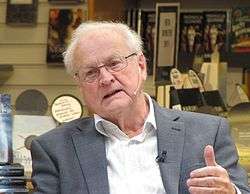Arvid Carlsson
| Arvid Carlsson | |
|---|---|
|
Carlsson in 2011 | |
| Born |
25 January 1923 Uppsala, Sweden |
| Nationality | Swedish |
| Alma mater | Lund University |
| Known for | Dopamine |
| Notable awards |
Magnus Blix’ Prize (1947) Pehr Dubb’s Gold Medal (1970) Anders Jahre’s Medical Prize (1974) Stanley R Dean Lecture and Award (1975) Wolf Prize in Medicine (1979) Gairdner Foundation Award (1982) Bristol-Myers Award (1989) Paul Hoch Prize (1990) Fred Springer Award (1990) Julius Axelrod Medal (1992) Lieber Prize (1994) Japan Prize (1994)[1] Antonio Feltrinelli International Award (1999) Nobel Prize in Physiology or Medicine (2000) |
Arvid Carlsson (born 25 January 1923) is a Swedish neuropharmacologist who is best known for his work with the neurotransmitter dopamine and its effects in Parkinson's disease. For his work on dopamine, Carlsson was awarded the Nobel Prize in Physiology or Medicine in 2000, along with co-recipients Eric Kandel and Paul Greengard.[2][3]
Carlsson was born in Uppsala, Sweden, son of Gottfrid Carlsson, historian and later professor of history at the Lund University, where he began his medical education in 1941. In 1944 he was participating in the task of examining prisoners of Nazi concentration camps, whom Folke Bernadotte, a member of the royal Swedish family, had managed to bring to Sweden. Although Sweden was neutral during World War II, Carlsson's education was interrupted by several years of service in the Swedish Armed Forces. In 1951, he received his M.L. degree and his M.D. He then became a professor at the University of Lund. In 1959 he became a professor at the University of Gothenburg.
In 1957 Kathleen Montagu succeeded in demonstrating the presence of dopamine in the human brain; later that same year Carlsson also demonstrated that dopamine was a neurotransmitter in the brain and not just a precursor for norepinephrine.[4][5] Carlsson went on to developed a method for measuring the amount of dopamine in brain tissues. He found that dopamine levels in the basal ganglia, a brain area important for movement, were particularly high. He then showed that giving animals the drug reserpine caused a decrease in dopamine levels and a loss of movement control. These effects were similar to the symptoms of Parkinson's disease. By administering to these animals L-Dopa, which is the precursor of dopamine, he could alleviate the symptoms. These findings led other doctors to try using L-Dopa on patients with Parkinson's disease, and found it to alleviate some of the symptoms in the early stages of the disease. L-Dopa is still the basis for most commonly used means of treating Parkinson's disease.[2]
While working at Astra AB, Carlsson and his colleagues were able to derive the first marketed selective serotonin reuptake inhibitor, zimelidine, from brompheniramine.[2] Zimelidine preceded both Fluoxetine (Prozac) and Fluvoxamine as the first SSRI, but was later withdrawn from the market due to rare cases of Guillain–Barré syndrome.[6]
Carlsson is opposed to the fluoridation of drinking water,[7][8][9] and lobbied in Sweden to make water fluoridation illegal.[10]
Still an active researcher and speaker at over 90 years of age, Carlsson, together with his daughter Maria, is working[11] on OSU6162, a dopamine stabilizer alleviating symtoms of post-stroke fatigue.[12]
References
- ↑ Laureates of the Japan Prize. japanprize.jp
- 1 2 3 Barondes, Samuel H. (2003). Better Than Prozac. New York: Oxford University Press. pp. 21–22, 39–40. ISBN 0-19-515130-5.
- ↑ Les Prix Nobel. 2001. The Nobel Prizes 2000, Editor Tore Frängsmyr, Nobel Foundation: Stockholm.
- ↑ Arvid Carlsson; Margit Lindqvist; Tor Magnusson (November 1957). "3,4-Dihydroxyphenylalanine and 5-hydroxytryptophan as reserpine antagonists". Nature. 180 (4596): 1200. doi:10.1038/1801200a0. PMID 13483658.
- ↑ Abbott A (2007). "Neuroscience: the molecular wake-up call". Nature. 447 (7143): 368–70. doi:10.1038/447368a. PMID 17522649. Retrieved 28 September 2008.
- ↑ "History: Discovery of the SSRIs (long) | Psycho-Babble". www.dr-bob.org. Retrieved 2016-06-22.
- ↑ Fluoride in drinking water can cause cancer, Svenska Dagbladet (in Swedish)
- ↑ Torell P, Forsman B (February 1979). "[Arvid Carlsson's fluoride ponderings 1978]". Tandlakartidningen (in Swedish). 71 (3): 142–57. PMID 287207.
- ↑ Nobel Laurette Dr. Arvid Carlsson On Water Fluoridation. youtube.com
- ↑ Bryson C. (2004) The Fluoride Deception. Seven Stories Press. p. p. 240. ISBN 1583225269.
- ↑ "Publications card". University of Gothenburg. 2010-11-25. Retrieved 2016-06-22.
- ↑ "Arvid Carlsson and Lena Carlsson". www.brainmessenger.se. Retrieved 2016-06-22.
External links
| Wikimedia Commons has media related to Arvid Carlsson. |

